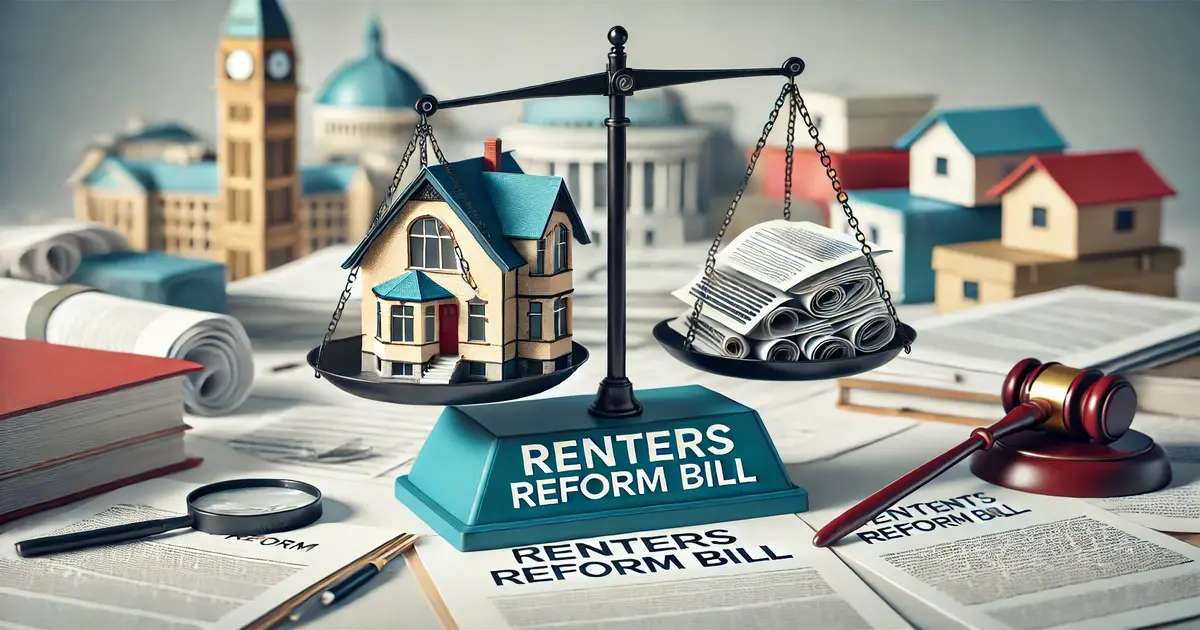The Impact of Labour’s Renters’ Rights Bill on Landlords: A Detailed Analysis
Introduction
The proposed Labour Party’s Renters’ Rights Bill has ignited significant debate within the property industry, especially among landlords.
This bill, which aims to strengthen tenants’ rights and create a fairer rental market, could profoundly reshape the landlord-tenant relationship.
In this article, we explore the potential implications of the Renters’ Rights Bill on landlords, focusing on the key areas that could lead to landlords losing control over their properties.
We also provide insights into how landlords can navigate this changing landscape while protecting their investments.
Key Provisions of the Renters’ Rights Bill
End of ‘No-Fault’ Evictions (Section 21)
The most controversial aspect of the Renters’ Rights Bill is the proposed abolition of Section 21, commonly known as ‘no-fault’ evictions.
Under the current law, landlords can evict tenants without providing a reason, giving them considerable control over their properties.
However, the Labour Party aims to eliminate this provision, meaning landlords would only be able to evict tenants for specific reasons, such as rent arrears or breach of tenancy terms.
Impact on Landlords
The removal of Section 21 could lead to longer tenancies, reducing landlords’ flexibility in managing their properties. Landlords may face challenges in regaining possession of their properties, particularly if they need them for personal use or wish to sell.
This change could also result in higher legal costs and prolonged disputes, as landlords would need to provide substantial evidence to justify evictions.
Introduction of Rent Controls
Labour’s Renters’ Rights Bill also proposes rent controls, capping the amount landlords can charge for rent increases.
This measure aims to protect tenants from sudden and significant rent hikes, ensuring affordability in the rental market.
Rent controls could limit landlords’ ability to increase rents in line with market trends or to reflect the costs of property maintenance and improvements. This might reduce the profitability of rental properties, especially in high-demand areas.
Additionally, landlords may face difficulties in covering mortgage payments and other expenses, potentially leading to a decline in property investments.
Mandatory Longer Tenancies
Another critical element of the Renters’ Rights Bill is the introduction of mandatory longer tenancies. The Labour Party advocates for standard tenancy agreements that last a minimum of three years, giving tenants greater security and stability.
While longer tenancies may reduce tenant turnover and the associated costs, they also limit landlords’ ability to adjust to changing market conditions.
Landlords may find it more challenging to address problematic tenants or to refurbish and sell their properties. Moreover, the potential for lengthy legal battles in cases of tenant non-compliance could increase.
Enhanced Property Standards
The Renters’ Rights Bill places a strong emphasis on improving property standards. This includes stricter regulations around property maintenance, energy efficiency, and safety measures.
Landlords would be required to meet higher standards, with penalties for non-compliance.
While improved property standards benefit tenants, they could lead to increased costs for landlords. Upgrading properties to meet new standards, particularly in older buildings, may require significant financial investment.
Non-compliance could result in fines or legal action, further straining landlords’ resources.
Strategies for Landlords to Adapt
Proactive Property Management
To navigate the changes proposed by the Renters’ Rights Bill, landlords should adopt a proactive approach to property management.
This includes maintaining open communication with tenants, addressing issues promptly, and ensuring that properties meet all legal requirements.
By building positive relationships with tenants, landlords can reduce the likelihood of disputes and ensure smoother tenancy agreements.
Financial Planning and Resilience
Landlords must also focus on financial resilience. This means planning for potential rent caps and increased expenses due to higher property standards.
Diversifying property portfolios and exploring alternative revenue streams, such as short-term rentals, could help mitigate the impact of these changes.
Legal Preparedness
Given the potential for more complex eviction processes and disputes, landlords should seek legal advice and be prepared for changes in the law.
Familiarising themselves with the legal grounds for eviction and maintaining thorough records of tenancy agreements, payments, and communications will be crucial.
Investment in Property Upgrades
Landlords should consider investing in property upgrades to meet the enhanced standards outlined in the Renters’ Rights Bill.
This not only ensures compliance but also increases the property’s value and attractiveness to tenants. Energy efficiency improvements, for example, could reduce long-term costs and appeal to environmentally conscious tenants.
The Broader Implications of Labour’s Renters’ Rights Bill
Market Impact and Potential Property Value Changes
The introduction of the Renters’ Rights Bill is likely to have broader market implications that extend beyond individual landlords.
The restriction on rent increases and the removal of ‘no-fault’ evictions could dampen investor confidence in the rental market.
As a result, some landlords might choose to exit the market, reducing the availability of rental properties and potentially driving up demand for the remaining stock.
Impact on Property Values
Reduced rental profitability and increased regulation could lead to a decline in property values, particularly in areas where rental yields are a key factor for investors.
Properties that require significant upgrades to meet new standards may see a decrease in demand, further impacting their market value.
However, properties that are well-maintained and compliant with the new regulations could become more attractive to tenants, leading to higher occupancy rates and stability in rental income.
Regional Variations in Impact
The effects of the Renters’ Rights Bill may vary significantly across different regions of the country. In high-demand urban areas, where rents are already at a premium, the introduction of rent controls and longer tenancies could have a more pronounced impact.
Landlords in these regions may face greater challenges in maintaining profitability and may need to reconsider their investment strategies.
Conversely, in less densely populated areas, where rents are lower, and tenant turnover is less frequent, the impact of these changes may be less severe.
However, the requirement for higher property standards could still pose a financial burden, particularly for landlords with older properties.
Social and Political Ramifications
The Renters’ Rights Bill also carries significant social and political implications. On the one hand, it aims to address the imbalance of power between landlords and tenants, promoting greater fairness and stability in the rental market.
This could lead to improved living conditions for millions of tenants, particularly those in vulnerable situations.
On the other hand, critics argue that the bill could exacerbate the housing crisis by discouraging investment in rental properties and reducing the availability of affordable housing.
The political debate surrounding this bill is likely to continue, with stakeholders from both sides of the argument voicing their concerns and advocating for changes.
Long-Term Trends in the Rental Market
The introduction of the Renters’ Rights Bill could signal a shift in the rental market towards more regulated and tenant-friendly policies.
This may lead to long-term changes in the way landlords operate, with a greater emphasis on compliance, tenant relations, and sustainable property management.
As the market adapts to these changes, we may also see a rise in alternative housing models, such as build-to-rent developments and co-living spaces, which could offer different approaches to addressing the needs of both landlords and tenants in this evolving landscape.
Preparing for the Future
Staying Informed and Engaged
Landlords must stay informed about the ongoing developments related to the Renters’ Rights Bill and its potential implications.
Engaging with industry bodies, attending seminars, and keeping up with legal updates will be essential for navigating this complex environment.
Networking with other landlords and sharing experiences can also provide valuable insights and support.
Evaluating Portfolio Strategy
With the potential changes on the horizon, landlords should take the time to evaluate their property portfolios and assess the viability of their current investments.
This may involve selling properties that are unlikely to meet the new standards or are located in areas where rent controls could have a significant impact.
At the same time, investing in properties that align with future market demands, such as those that are energy-efficient and located in high-demand areas, could offer better long-term returns.
Enhancing Tenant Relations
A positive landlord-tenant relationship is more important than ever in light of the proposed changes.
Landlords should focus on creating a supportive and responsive environment for their tenants, addressing concerns promptly, and ensuring that properties are well-maintained.
By fostering trust and open communication, landlords can reduce the likelihood of disputes and create a more stable and successful rental business.
Exploring Legal and Financial Support
Given the complexity of the changes proposed by the Renters’ Rights Bill, landlords may benefit from seeking professional legal and financial advice.
This could include consulting with property lawyers to understand the new eviction rules or working with financial advisors to plan for potential rent caps and property upgrades.
Being well-prepared will help landlords manage the transition more effectively.
Conclusion
Labour’s Renters’ Rights Bill represents a significant shift in the rental market, with wide-ranging implications for landlords.
While the proposed changes aim to protect tenants and create a fairer rental environment, they also present challenges that landlords must navigate carefully.
By staying informed, adapting their strategies, and maintaining strong relationships with tenants, landlords can continue to succeed in this evolving landscape.
The key to thriving in the future rental market will be a combination of proactive management, financial resilience, and a willingness to embrace change.
As the debate around the Renters’ Rights Bill continues, landlords must remain engaged and prepared to adapt to whatever challenges and opportunities lie ahead.
FAQ About Labour’s Renters’ Rights Bill
What is the Renters’ Rights Bill?
The Renters’ Rights Bill is a proposed piece of legislation by the Labour Party in the UK that aims to enhance tenant protections and create a fairer rental market.
Key aspects of the bill include the abolition of ‘no-fault’ evictions (Section 21), the introduction of rent controls, mandatory longer tenancies, and stricter property standards.
How will the abolition of Section 21 affect landlords?
The removal of Section 21 means that landlords will no longer be able to evict tenants without providing a specific reason.
This could lead to longer tenancies and reduced flexibility for landlords, as they will need to provide justifiable reasons, such as rent arrears or breach of tenancy terms, to regain possession of their properties.
What are rent controls, and how will they impact landlords?
Rent controls limit the amount of rent landlords can increase, preventing sudden and significant rent hikes.
For landlords, this could mean a reduction in rental income, particularly in high-demand areas, and may affect their ability to cover costs such as mortgage payments and property maintenance.
What are the proposed changes to tenancy agreements under the Renters’ Rights Bill?
The bill proposes mandatory longer tenancies, with a minimum term of three years. This is designed to provide tenants with greater security and stability.
However, for landlords, it may reduce their ability to adapt to changing market conditions and manage their properties as flexibly as before.
What new property standards will landlords need to meet?
The Renters’ Rights Bill includes stricter regulations around property maintenance, energy efficiency, and safety standards.
Landlords will need to ensure their properties meet these higher standards, which may require significant financial investment, especially in older properties.
How can landlords prepare for the Renters’ Rights Bill?
Landlords can prepare by staying informed about the bill’s progress and seeking professional advice. Proactive property management, financial planning, and legal preparedness are key strategies.
Landlords should also consider upgrading their properties to meet new standards and fostering positive relationships with tenants to reduce the likelihood of disputes.
Will the Renters’ Rights Bill affect property values?
The bill could potentially impact property values, particularly in areas where rental yields are a key factor.
Reduced rental profitability and increased regulation may lead to a decline in demand for certain properties, while those that meet new standards and are located in high-demand areas may retain or even increase in value.
How will the Renters’ Rights Bill affect the broader rental market?
The Renters’ Rights Bill could lead to significant changes in the rental market, including a potential reduction in the availability of rental properties as some landlords may choose to exit the market.
It may also drive the adoption of alternative housing models, such as build-to-rent developments, and could signal a shift towards more regulated and tenant-friendly rental practices.
What are the social and political implications of the Renters’ Rights Bill?
Socially, the bill aims to address the imbalance of power between landlords and tenants, improving living conditions for renters.
Politically, it has sparked debate, with supporters advocating for tenant protections and critics warning of potential negative impacts on the housing market and investment in rental properties.
When will the Renters’ Rights Bill come into effect?
As of now, the Renters’ Rights Bill is still in the proposal stage, and its timeline for implementation will depend on the legislative process.
Landlords should stay updated on any developments to ensure they are prepared for any changes once the bill is enacted.
Can landlords still evict tenants under the Renters’ Rights Bill?
Yes, landlords can still evict tenants under the Renters’ Rights Bill, but only for specific reasons, such as non-payment of rent, breach of tenancy terms, or if they need the property for personal use.
The process may require more legal documentation and justification compared to the current ‘no-fault’ eviction system.
What should landlords do if they cannot afford property upgrades required by the new standards?
If landlords find it challenging to afford the necessary property upgrades, they may need to explore financing options or seek professional advice on managing these costs.
In some cases, it might be worth considering whether to retain or sell the property, depending on its viability under the new regulations.
This FAQ provides an overview of the key concerns landlords may have regarding the Labour Party’s Renters’ Rights Bill. Staying informed and prepared will be crucial as this legislation progresses.
Useful links
UK Government Legislation Updates
Stay updated on the progress of the Renters’ Rights Bill through the official UK Government website: UK Parliament – Bills and Legislation
British Landlords Association (The BLA)
The BLA offers resources, legal advice, and updates specifically for landlords: The BLA Website
For information on tenants’ rights and landlord responsibilities, Citizens Advice provides detailed guidance: Citizens Advice – Renting
These links should help you stay informed and better navigate the implications of the Renters’ Rights Bill and related developments in the UK rental market.
The British Landlords Association is a national landlord association for UK landlords and one of the largest landlord associations in the UK. Join us now for £79.95!
Our top read blogs:
Can you avoid paying the full penalty for not protecting the deposit?
Deposit Prescribed Information Signed by Agents or Companies
Disclaimer:
This post is for general use only and is not intended to offer legal, tax, or investment advice; it may be out of date, incorrect, or maybe a guest post. You are required to seek legal advice from a solicitor before acting on anything written hereinabove.





